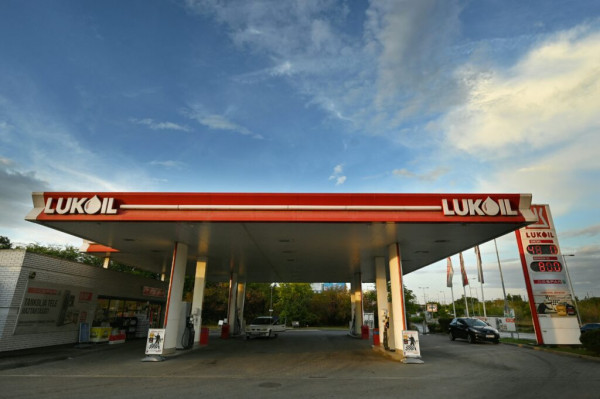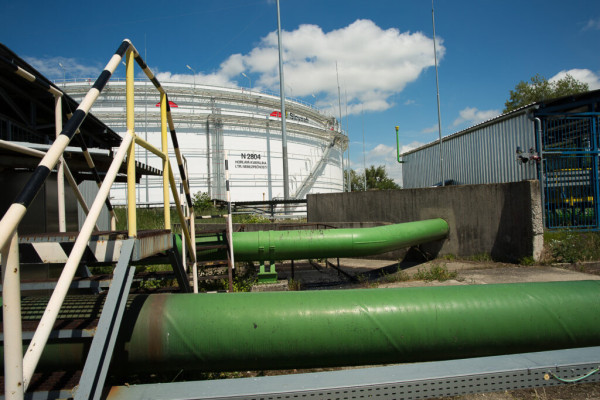Hungary facing fuel crisis as Ukraine turns up heat on Russian oil supplies
Hungary is racing against time to avoid power outages and fuel shortages after Ukraine imposed a partial ban on Russian oil passing through its territory.
Kyiv last month imposed sanctions blocking the transit of pipeline crude sold by Moscow’s largest private oil firm, Lukoil, to Central Europe — partially negating an exemption to sanctions set up by the European Union to give Russian-reliant countries extra time to wean off supplies.
Ukraine's aim is to throttle a key source of revenue for the Kremlin’s war chest more than two years after its full-scale invasion of the country.
But the move is sparking fears of supply shortages in Budapest, which relies on Russia for 70 percent of its oil imports — and Lukoil for half that amount.
“The Ukrainian measures could create a severe situation,” Ilona Gizińska, a researcher and Hungary expert at the Centre for Eastern Studies think tank, said. She added that Hungarians could face sky-high energy prices and electricity shortages in just “weeks” unless it finds a solution.
According to the Center for Research on Energy and Clean Air think tank, Hungary spent almost a quarter of a billion euros on Russian crude and gas in April this year alone.
On Friday, Budapest’s top diplomat Péter Szijjártó said Ukraine's measure could threaten Hungary's long-term energy security, slamming Kyiv for the move.
“Ukrainian authorities showed willingness to find a solution to the situation, but these attempts have faded since,” he said.
At a meeting with Russian Foreign Minister Sergey Lavrov earlier in the week, Szijjártó argued the country had begun talks with Moscow to find alternative supplies of Russian oil.
“There is a new legal situation in Ukraine now, on the basis of which Lukoil is currently not making deliveries to Hungary,” he said Tuesday. “We are now working on a legal solution ... because Russian oil is important from the perspective of our energy security.”

On Friday, Kremlin Press Secretary Dmitry Peskov accused Ukraine of making a “political decision” and claimed the situation is “critical” for those still buying Russian oil.
The Lukoil ban comes as relations between Kyiv and Budapest grow increasingly tense. Ukrainian President Volodymyr Zelenskyy this week hit out at Hungarian premier Viktor Orbán for meeting Russian leader Vladimir Putin as part of a self-declared “peace mission” this month. Budapest has also persistently held up EU weapons deliveries to Kyiv.
Eastern enmity
Following Moscow’s full-scale invasion of Ukraine, the EU imposed an embargo on imports of Russian oil arriving to the bloc by sea. But it exempted pipeline supplies — including those coming via the Druzhba pipeline to Hungary, Slovakia and the Czech Republic — to give those countries time to find alternative supplies, with the understanding they would do so as fast as possible.
Ukraine has now taken the matter into its own hands, according to Inna Sovsun, a Ukrainian lawmaker from the opposition pro-EU Holos party who sits on the parliament's energy committee.
“We have been waiting for over two years for the EU, for the G7, to introduce real sanctions against Russian [pipeline] oil,” she said, noting that the pipeline still carries 200,000 barrels of crude per day.
With Moscow making $180 billion from its oil exports last year, “it's actually absurd to allow them to make this money by transporting this oil through Ukrainian territory, if the money is then being used to kill us,” Sovsun added.
But Sovsun also hinted at a secondary aim for the ban: To overturn Hungary's opposition to weapons deliveries to Ukraine and Kyiv's accession to the EU.
“We have really tried all the diplomatic solutions, and they never worked,” she said. “So it seems like we have to find some other approaches in how to talk to them.”
It's not only Hungary caught up in the sanctions net: Slovakia's major refiner Slovnaft buys crude from Lukoil. But a spokesperson for the country’s economy ministry told POLITICO that the firm has found alternative supplies and, so far, “the supply of Russian oil to Slovakia has not been halted.”
The sanctions, which force Kyiv's pipeline operator UkrTransNafta to reject applications for Lukoil-contracted oil to pass through Druzhba, so far don’t target other Russian oil firms that continue to ship crude via Ukraine, including Rosneft and Tatneft.

That’s partly because the pipeline continues to ship non-Russian oil from Kazakhstan to Germany, said Olena Lapenko, a Ukrainian energy security expert at the DiXi Group think tank. But after Lukoil, “sanctions against other companies producing and exporting Russian oil are on the way,” she predicted.
Hungary must now act fast to find other options.
“Any protracted halt in supplies would force regional refiners to tap into their stocks, run them down and in the meantime seek some sort of diplomatic settlement to the issue,” Viktor Katona, lead crude analyst at intelligence firm Kpler, said.
Budapest could now negotiate more imports from Rosneft, said Gizińska, the researcher, or ramp up supplies from Croatia via the Adria Pipeline. Hungary could also release some of its emergency strategic reserves, which have enough oil for 90 days.
The Ukrainian and Hungarian governments didn’t respond to a request for comment. Hungary's major oil supplier MOL and Russia’s Lukoil also didn’t reply to written questions from POLITICO.